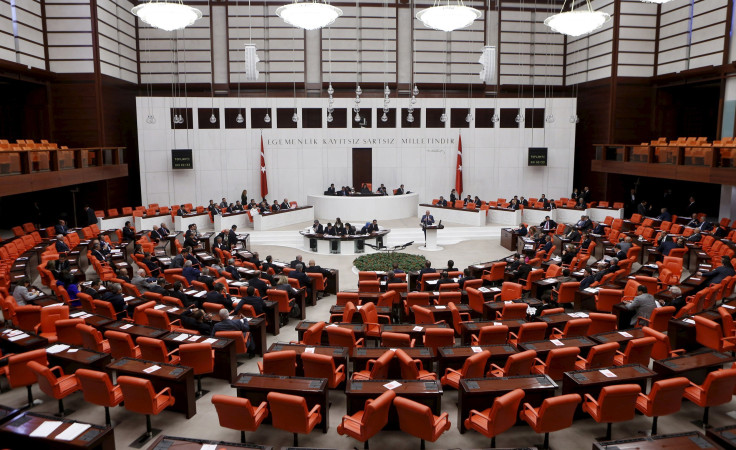Turkey’s Ruling AKP Party Loses Majority In Parliament, Limiting Erdogan’s Push For Broader Executive Powers

Update as of 12.20 a.m. EDT: Preliminary results based on 99.9 percent of the votes counted show that Turkey's governing Justice and Development Party (AKP) has secured 41 percent of Sunday’s votes, losing its parliamentary majority.
The main opposition Republican People's Party (CHP) reportedly managed to secure 25 percent of the votes cast while the Nationalist Movement Party (MHP) secured 16.5 percent.
The pro-Kurdish Peoples' Democracy Party (HDP) also crossed the country’s 10 percent electoral threshold for parliamentary representation and won 13 percent of the votes.
Original story:
Preliminary polls show for the first time in 13 years, Turkey could have a coalition government, limiting President Recep Tayyip Erdoğan’s ability to rewrite the constitution and boost his executive powers. Erdoğan’s ruling Justice and Development Party (AKP) has lost its supermajority, early results show, and the Kurdish People's Democracy Party (HDP) garnered the votes needed to enter parliament.
The ballot boxes opened at 8 a.m. local time and closed at 5 p.m. About 54 million people were eligible to vote in the election, according to the country’s national election commission.
With the majority of the votes counted, the ruling AKP appears to have lost its majority in parliament and the center-left Republican People's Party (CHP) appears to have retained its status as the second largest party in the country. The left-wing pro-Kurdish HDP passed the 10 percent threshold needed for parliamentary representation. On Sunday night, HDP supporters took to the streets of the Kurdish city of Diyarbakir in the eastern part of the country to celebrate.
#LIVE HDP supporters take to streets to celebrate election results in Diyarbakır http://t.co/DSQk1sBgUq pic.twitter.com/APQejxvewX
- Today's Zaman (@todayszamancom) June 7, 2015Many people in Turkey who wanted to limit Erdoğan’s presidential powers voted for the HDP party, analysts said. Other notable wins included the victory for three Armenians from the AKP CHP and HDP parties.
#TurkeyElections - change in number of votes, seats and vote share over time - drop in AKP, impact of HDP: pic.twitter.com/dWHuNmHcTh
- Alberto Nardelli (@AlbertoNardelli) June 7, 2015The AKP sought to secure two-thirds of the 550 seats in the parliament so it could rewrite the constitution and replace the country’s 92-year-old parliamentary system with a presidential system, one that would give Erdoğan more sweeping executive powers. Erdoğan has been pushing for the rewrite since campaigning for president last year.
"A new constitution on the path to new Turkey will be one of our priorities if elected president. ... A new constitution means a new future," Erdoğan said in a speech last year before he was elected. “The old Turkey is now a thing of the past. It is now a country where people do not wake up every morning fearing another crisis. It is a country where people have hope for the future.”
The rewrite of the constitution would have changed the office of president, giving Erdoğan more power than the prime minister and creating an American-style presidential system.
Now that the AKP has lost the majority in parliament, Erdoğan, a three-time prime minister, faces the prospect of continuing in the largely ceremonial post of president while real executive power lies in the hands of Prime Minister Ahmet Davutoğlu.
This year's national elections focused primarily on the slowing economy, civil rights and the Kurdish peace process.
There are questions about how the AKP will react to the newest parliament member -- the Kurdish HDP -- which will push for greater rights for its constituents. President Erdoğan has initiated a peace process with the Kurds, but that process was esentially stalled during the past year because of the campaign cycle.
One issue left off of the agenda during campaign season was the country's growing energy sector. Any new coalition partner could alter the direction of Turkey’s energy policy, threatening deals with Russia, its partner on the major Turkish Stream pipeline deal -- and possibly pushing the country closer to the European Union.
The future of Ankara’s energy policy remains uncertain, though, mostly because the other major parties, including the CHP, the Nationalist Movement Party and the HDP, have virtually no track record on energy or environmental issues related to energy development.
Although the AKP party lost the majority in parliament, Erdoğan is not likely to stop his push for attaining more political power. He will also likely remain the country's strongest political figure not only because of his support among conservatives in the country, but also because he has acted as the go-to leader for international discussions and negotiations about the wars in Iraq and Syria, and developing a strategy for defeating the Islamic State group.
If Erdoğan continues to hold on to the power he has wielded since becoming president last summer, liberals in Turkey worry he will continue to crack down on journalists and protestors, and limit rights for women and LGBT individuals.
© Copyright IBTimes 2024. All rights reserved.











